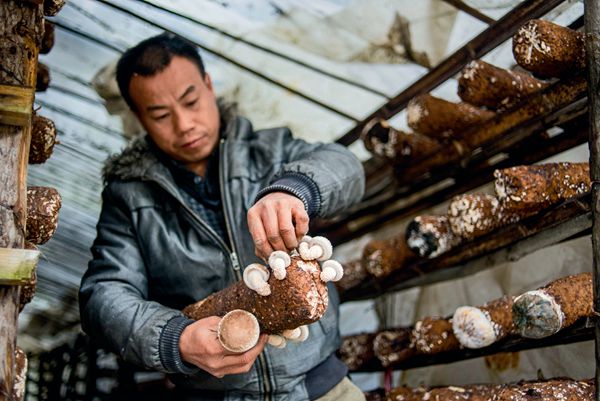China Set to Hit Target of Eliminating Poverty
China Today by XU LIN, January 23, 2017 Adjust font size:
According to Hofman, China has made a concerted effort in targeted poverty reduction. “The State Council Leading Group Office of Poverty Alleviation and Development which we’ve been working with for many years is a phenomenal institution. The presence of such an organization meant that there’s a real focus on the issue of poverty. They developed targeted poverty programs that evolved over time – first in poor areas, but increasingly also with poor people so that they could help those who could not benefit from the general growth to get out of poverty themselves.”

Wu Laojiang, a young disabled man in Guizhou Province, started a mushroom production venture with the help of local poverty relief projects.
In December 2015, China set itself a goal to lift the remaining 55 million poor people out of poverty by 2020. Mr. Hofman thinks it is an ambitious goal, but he believes that China can achieve it if continues with its current growth rates and policies. However, it is not the end goal since there are many more people that live slightly above the poverty line and can still be considered “poor.” He further pointed out that China should continue investing in poor people to make sure that their education, health, and insurance systems are up-to-date. In his words: “Health and the cost of health are actually important causes of poverty in the country.”
Cooperation Mode Constantly Reorients
The World Bank and China have had a long and productive cooperation in poverty reduction. While it has witnessed the progress of China’s efforts in poverty alleviation, the organization constantly reorients its mode of cooperation in accordance with the direction the development is taking. Mr. Hofman revealed that in addition to working on projects, the World Bank has done three major poverty reviews which provided the analytical basis with which to design the next phase of poverty reduction programs.
The first generation program in China, according to Hofman, was very much aligned with the then situation more than 25 years ago. “There were many poor counties, most of which relied on agriculture. So we invested in agricultural infrastructure and in helping farmers get right fertilizers, seeds, and education to ensure they could absorb modern techniques.” But today, personal background and characteristics are much more determinate of poverty. “It matters far less where you live and whether you are poor or not than what your personal characteristics are,” he explained, “whether you have somebody in the family who works, whether you have got a good education, whether you have nobody sick in the family. Hence, the poverty programs have also changed.”